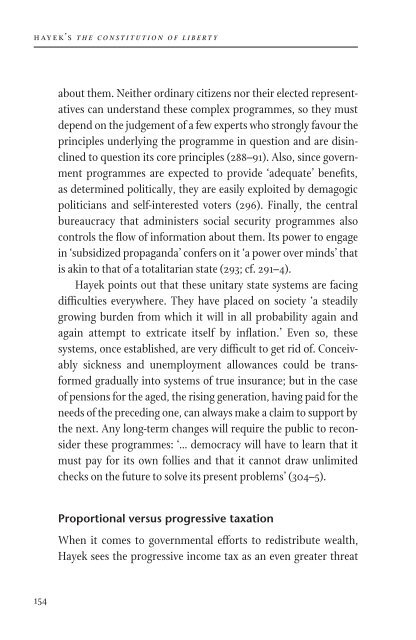Hayek's The Constitution of Liberty - Institute of Economic Affairs
Hayek's The Constitution of Liberty - Institute of Economic Affairs
Hayek's The Constitution of Liberty - Institute of Economic Affairs
Create successful ePaper yourself
Turn your PDF publications into a flip-book with our unique Google optimized e-Paper software.
h ay e k ’ s t h e c o n s t i t u t i o n o f l i b e r t y<br />
s o c i a l s e c u r i t y, t a x a t i o n a n d t h e r e d i s t r i b u t i o n o f w e a lt h<br />
about them. Neither ordinary citizens nor their elected representatives<br />
can understand these complex programmes, so they must<br />
depend on the judgement <strong>of</strong> a few experts who strongly favour the<br />
principles underlying the programme in question and are disinclined<br />
to question its core principles (288–91). Also, since government<br />
programmes are expected to provide ‘adequate’ benefits,<br />
as determined politically, they are easily exploited by demagogic<br />
politicians and self-interested voters (296). Finally, the central<br />
bureaucracy that administers social security programmes also<br />
controls the flow <strong>of</strong> information about them. Its power to engage<br />
in ‘subsidized propaganda’ confers on it ‘a power over minds’ that<br />
is akin to that <strong>of</strong> a totalitarian state (293; cf. 291–4).<br />
Hayek points out that these unitary state systems are facing<br />
difficulties everywhere. <strong>The</strong>y have placed on society ‘a steadily<br />
growing burden from which it will in all probability again and<br />
again attempt to extricate itself by inflation.’ Even so, these<br />
systems, once established, are very difficult to get rid <strong>of</strong>. Conceivably<br />
sickness and unemployment allowances could be transformed<br />
gradually into systems <strong>of</strong> true insurance; but in the case<br />
<strong>of</strong> pensions for the aged, the rising generation, having paid for the<br />
needs <strong>of</strong> the preceding one, can always make a claim to support by<br />
the next. Any long-term changes will require the public to reconsider<br />
these programmes: ‘… democracy will have to learn that it<br />
must pay for its own follies and that it cannot draw unlimited<br />
checks on the future to solve its present problems’ (304–5).<br />
Proportional versus progressive taxation<br />
When it comes to governmental efforts to redistribute wealth,<br />
Hayek sees the progressive income tax as an even greater threat<br />
to freedom than the welfare state’s social security policies.<br />
Progressive taxation redistributes wealth more efficiently than<br />
such policies; without it, the scope <strong>of</strong> redistribution ‘would be<br />
very limited.’ Moreover, its appeal is broader: ‘Redistribution by<br />
progressive taxation has come to be almost universally accepted<br />
as just.’ Whether joined to the welfare state or not, progressive<br />
taxation is now ‘the chief means <strong>of</strong> redistributing incomes.’<br />
Moreover, it is the main source <strong>of</strong> democratic irresponsibility and<br />
governmental arbitrariness (306–8).<br />
Hayek advocates proportional taxation, which applies a<br />
constant rate to everyone. With a progressive system, by contrast,<br />
the rate <strong>of</strong> taxation increases as the amount being taxed increases.<br />
<strong>The</strong> wealthy pay more under both systems, but at an escalating<br />
rate under a progressive one. Hayek uses historical evidence to<br />
illustrate his claim that there is no limit, in principle, to how high<br />
a progressive rate can go. When a progressive income tax was<br />
introduced in Prussia in 1891, the upper rate was 4 per cent. In<br />
1910 Great Britain followed suit, as did the USA in 1913, setting<br />
the upper rate at ‘8¼ and 7 percent, respectively. Yet within<br />
thirty years these figures had risen to 97½ and 91 percent’ (310).<br />
This outcome is not surprising to Hayek, since ‘all arguments<br />
in support <strong>of</strong> progression can be used to justify any degree <strong>of</strong><br />
progression’ (313).<br />
<strong>The</strong> case for progressive taxation, as Hayek presents it, rests<br />
mainly on four claims, which we may call scientific, political, expedient<br />
and moral; and his aim is chiefly to refute these particular<br />
claims.<br />
<strong>The</strong> advocates <strong>of</strong> progressive taxation hoped to give it scientific<br />
respectability by appealing to utility analysis, specifically<br />
to the principle that income has a diminishing marginal utility.<br />
154<br />
155












